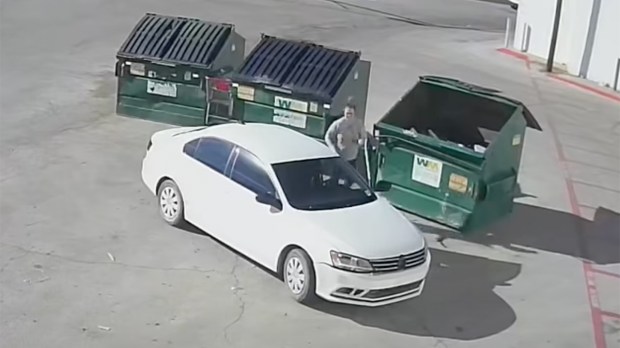Help Aleteia continue its mission by making a tax-deductible donation. In this way, Aleteia's future will be yours as well.
*Your donation is tax deductible!
Hobbs, New Mexico, teenager Alexis Avila could have dropped her newborn baby off at a local fire station, hospital or health clinic. According to New Mexico’s Safe Haven Law, a version of which exists in all 50 states, any mother who feels unable to care for her newborn can give it up at a designated safe haven, with no questions asked.
Instead, Avila, 18, allegedly put the infant in a dumpster.
Happily, a woman and two men rummaging through the dumpster six hours later heard the baby’s cry and rescued him.
The incident is not uncommon. Just in the past month, airport officers rescued a child from the trash bin of an airplane bathroom, after a woman on a flight from Madagascar to Mauritius allegedly left him there. Around the same time, state troopers in Alaska said they had found a child abandoned in a cardboard box. A note attached to the box said that the baby’s parent felt unable to care for the newborn.
In all three cases, the children survived and seem to be doing well. Sadly, that is not always the outcome.
In New Mexico, Avila pleaded not guilty on Wednesday to charges of attempted first-degree murder and child abuse, KCBD reported. Local police said that she admitted to throwing her baby into a dumpster just hours after giving birth. She claims she didn’t know she was pregnant until the day before. Police found Avila after viewing the abandonment on security camera video.
The infant is in the care of the New Mexico Department of Children, Youth and Families.
Sister Mary Margaret Hope, S.V., co-director of the Archdiocese of New York’s Respect Life Office, said that such incidents happen “most often in those unusual cases when a woman discovers she’s pregnant very shortly before she gives birth.”
“For whatever reason she doesn’t realize that she’s pregnant until she’s about to give birth,” Sister Hope, a member of the Sisters of Life, said in an interview. “Typically, if a woman realizes she’s pregnant earlier, she’s more likely to go have an abortion. Often, it’s someone who is very young, teenagers who just don’t know what to do. And they’re more likely to not know they’re pregnant, just because they don’t really know the signs. They would just be in denial.”
Crisis of identity
In such cases, Sister Hope said, the young woman is likely to experience a crisis of identity. Suddenly, she finds that she’s pregnant, but motherhood was not on her radar at all.
“She can’t reconcile these two images of herself and how she thought her life would be, and the idea that ‘I’m now a mother.’ If a woman doesn’t have a strong sense of self, she’s thrown into chaos, into crisis. And she isn’t thinking clearly; she’s not making good decisions, and she’s also not really capable of the self-sacrifice, overcoming hardships that is often required in a situation like this.”
Sister Hope said that if such a woman came to the Sisters of Life for help, the nuns would try to help her “be strengthened in her identity, that she is good, to know that she’s a child of God who has been entrusted with a child, that she is capable of motherhood, that this is who she is. And if she’s strengthened in that identity, then she’s capable of doing anything. We’ve seen so many courageous women who, once they feel stabilized in their identity, they can overcome any obstacle, whether it’s money or housing or whatever the particular challenges are for her in terms of this pregnancy.”
Sister Hope believes that in a case like this, the woman didn’t find support in places an expectant mother normally would. “She didn’t find someone she could turn to, to share in that moment of crisis with ‘What do I do? I don’t know how to handle this baby. I just gotta get rid of it.’ That’s all she’s thinking. She’s not thinking of what a horrible thing she’s doing; she’s just kind of acting on auto-pilot.”
Compassionate response
When Avila made her court appearance this week, a dozen or so protesters stood outside the courtroom with signs indicating their disapproval of her actions. Pam Bishop, client services director at the Warrenton Pregnancy Center in Virginia, however, feels that women who abandon their newborns in this way need compassion.
“For her – and I’m totally speculating – based on what I read, her social support system was not as healthy as it could have been, if she gave birth to a baby alone in a bathroom,” Bishop said in an interview. “Her social support includes her parents and her family, maybe her church community, her friends. Obviously her social support network was not as healthy as one would hope for a young person.”
Bishop surmised that Avila was not healthy spiritually or emotionally, either. “Emotionally healthy people don’t do what she did. So she needs some help, psychologically, probably,” she said. “Obviously in that moment, she was desperate, was in a situation that was too big for her to handle.”
Both Sister Hope and Pam Bishop said that Safe Haven laws have provided a good alternative to women who are tempted to abandon their babies.
According to the National Safe Haven Alliance, which “equips Safe Haven Providers and parents facing unplanned pregnancies with safe alternatives that prevent infant abandonment while providing holistic care for both parents and babies,” 4,127 babies have been saved through Safe Haven since 1999. In 2020, the latest year for which statistics are available, only 37 babies have been illegally abandoned in the U.S.
In a crisis? Call this number
In New Mexico, a baby must be directly handed to a Safe Haven provider, but in some places there are safe haven boxes, also called “baby hatches,” where a woman can anonymously leave an infant.
“They don’t have to actually talk to anyone or see anyone, so they might just feel a little more anonymous in that situation and safer to leave the baby somewhere,” Sister Hope said. “The woman’s feeling a lot of shame at that moment, so she might feel a little nervous to go into a fire station and have to speak to someone.”
Sister Hope said that in an ideal situation, if a woman receives support much earlier in her pregnancy and yet felt unable to care for a baby, she would probably be in a better position to make plans for adoption.
“She would be able to make that decision in full freedom and discernment and not in a moment of panic,” Sister Hope said. “The decision to place a child for adoption is not an easy one; it’s something a woman is going to live with the rest of her life, knowing that she made that choice. She needs to know that she made it in full freedom and confidence, knowing that this is the best decision I can make for my child; this is the most loving thing I can do. I know that I can’t take care of the child, so I’m going to entrust it to someone who can. If she makes that decision in freedom, she’s going to be able to live with that decision, whereas it’s obviously not ideal if a woman abandons her child in that moment of chaotic panic, when she doesn’t know what to do.”
Commenting on the New Mexico case, Bishop said, “She did something horrific, but she also deserves compassion. She was hurting and not well in multiple areas of potential wellness. In that regard, St. Julian of Norwich said, ‘When God sees our sin, he sees the pain in us.’”


